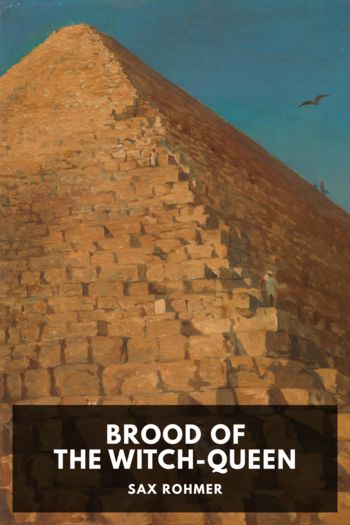Short Fiction - Robert E. Howard (the reading list TXT) 📗

- Author: Robert E. Howard
Book online «Short Fiction - Robert E. Howard (the reading list TXT) 📗». Author Robert E. Howard
At any rate he was sure that the oracle would be made to say that the gods willed it that Keshan should follow Thutmekri’s wishes, and he was sure, too, that it would drop a few pointed remarks concerning himself. After that Keshia would be too hot for the Cimmerian, nor had Conan had any intention of returning when he rode away in the night.
The oracle chamber held no clue for him. He went forth into the great throne-room and laid his hands on the throne. It was heavy, but he could tilt it up. The floor beneath, a thick marble dais, was solid. Again he sought the alcove. His mind clung to a secret crypt near the oracle. Painstakingly he began to tap along the walls, and presently his taps rang hollow at a spot opposite the mouth of the narrow corridor. Looking more closely he saw that the crack between the marble panel at that point and the next was wider than usual. He inserted a dagger-point and pried.
Silently the panel swung open, revealing a niche in the wall, but nothing else. He swore feelingly. The aperture was empty, and it did not look as if it had ever served as a crypt for treasure. Leaning into the niche he saw a system of tiny holes in the wall, about on a level with a man’s mouth. He peered through, and grunted understandingly. That was the wall that formed the partition between the alcove and the oracle chamber. Those holes had not been visible in the chamber. Conan grinned. This explained the mystery of the oracle, but it was a bit cruder than he had expected. Gorulga would plant either himself or some trusted minion in that niche, to talk through the holes, and the credulous acolytes would accept it as the veritable voice of Yelaya.
Remembering something, the Cimmerian drew forth the roll of parchment he had taken from the mummy and unrolled it carefully, as it seemed ready to fall to pieces with age. He scowled over the dim characters with which it was covered. In his roaming about the world the giant adventurer had picked up a wide smattering of knowledge, particularly including the speaking and reading of many alien tongues. Many a sheltered scholar would have been astonished at the Cimmerian’s linguistic abilities, for he had experienced many adventures where knowledge of a strange language had meant the difference between life and death.
These characters were puzzling, at once familiar and unintelligible, and presently he discovered the reason. They were the characters of archaic Pelishtim, which possessed many points of difference from the modern script, with which he was familiar, and which, three centuries ago, had been modified by conquest by a nomad tribe. This older, purer script baffled him. He made out a recurrent phrase, however, which he recognized as a proper name: Bît-Yakin. He gathered that it was the name of the writer.
Scowling, his lips unconsciously moving as he struggled with the task, he blundered through the manuscript, finding much of it untranslatable and most of the rest of it obscure.
He gathered that the writer, the mysterious Bît-Yakin, had come from afar with his servants, and entered the valley of Alkmeenon. Much that followed was meaningless, interspersed as it was with unfamiliar phrases and characters. Such as he could translate seemed to indicate the passing of a very long period of time. The name of Yelaya was repeated frequently, and toward the last part of the manuscript it became apparent that Bît-Yakin knew that death was upon him. With a slight start Conan realized that the mummy in the cavern must be the remains of the writer of the manuscript, the mysterious Pelishtim, Bît-Yakin. The man had died, as he had prophesied, and his servants, obviously, had placed him in that open crypt, high up on the cliffs, according to his instructions before his death.
It was strange that Bît-Yakin was not mentioned in any of the legends of Alkmeenon. Obviously he had come to the valley after it had been deserted by the original inhabitants—the manuscript indicated as much—but it seemed peculiar that the priests who came in the old days to consult the oracle had not seen the man or his servants. Conan felt sure that the mummy and this parchment were more than a hundred years old. Bît-Yakin had dwelt in the valley when the priests came of old to bow before dead Yelaya. Yet concerning him the legends were silent, telling only of a deserted city, haunted only by the dead.
Why had the man dwelt in this desolate spot, and to what unknown destination had his servants departed after disposing of their master’s corpse?
Conan shrugged his shoulders and thrust the parchment back into his girdle—he started violently, the skin on the backs of his hands tingling. Startlingly, shockingly in the slumberous stillness, there had boomed the deep strident clangor of a great gong!
He wheeled, crouching like a great cat, sword in hand, glaring down the narrow corridor from which the sound had seemed to come. Had the priests of Keshia arrived? This was improbable, he knew; they would not have had time to reach the valley. But that gong was indisputable evidence of human presence.
Conan was basically a direct-actionist. Such subtlety as he possessed had been acquired through contact with the more devious races. When taken off guard by some unexpected occurrence, he reverted instinctively to type. So now, instead of hiding or slipping away in the opposite direction as the average man might have done,





Comments (0)